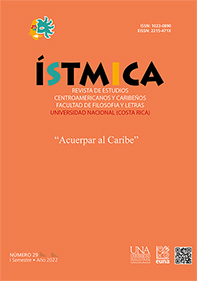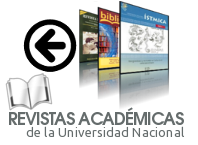The mythical speech as a tool for the Afro-descendant political claim in Changó, el gran putas of Manuel Zapata Olivella
DOI:
https://doi.org/10.15359/istmica.29.4Keywords:
Myth, Afro-descendants, Muntú, Changó, Political ClaimAbstract
The main objective of this article is to analyze the relevance of the mythical discourse in the novel Changó, el gran putas (1983) of the Colombian writer Manuel Zapata Olivella. It seeks to understand that this discourse is present in the work on three levels, which despite being different, constantly complement and intertwine: the first level of them is the mythical discourse as philosophy. For the understanding of this level, you will realize the Muntú worldview and Yoruba religion that is presented in the narrative. The second level is the myth as a narration, delving into the story of the curse of Chango that takes place in the novel. And, the third level is the myth as an engine of action, analyzing the relevance that certain characters have within the plot in relation to the material and political evolution of Afro-descendant peoples. All this to verify that the mythical discourse does not fulfill a merely narrative or contemplative function of an origin or a distant past, but rather constitutes a tool for cultural and political vindication for Afro-descendant peoples in America.
References
Barthes, Roland. 1972. Myth today. En Mithologies. New York: The Noonday Press.
Boticci, Chiara. A Philosophy of Political Myth. New York: Cambridge University Press, 2007.
Eliade, Mircea. Mito y Realidad. Barcelona: Editorial Labor S.A, 1991.
Figueroa, Victor. “An Afrocentric Theodicy of Liberation: Manuel Zapata Olivella’s Changó el gran putas” En Prophetic Visions of the Past. (2015): 196-236.
Sierra Díaz, Diana.“El Muntu: la diáspora del pensamiento filosófico africano en Changó, el gran putas de Manuel Zapata Olivella” En La Palabra. (2016): 23-44.
Zapata Olivella, Manuel. Changó, el gran putas. Bogotá: Ministerio de Cultura, 2010.
Zapata Olivella, Manuel. Por los senderos de sus ancestros. Comp. Alfonso Múnera. Bogotá: Ministerio de Cultura, 2010.
Zapata Olivella, Manuel. El árbol brujo de la libertad. Santiago de Cali: Universidad del Valle y Universidad de Cartagena, 2011.
Published
How to Cite
Issue
Section
License
Las personas autoras que publiquen en esta revista permiten cesión gratuita, exclusiva, de ámbito mundial de sus derechos de autoría a la Universidad Nacional (Costa Rica), conservando únicamente sus derechos morales sobre la obra publicada.
Los artículos pueden ser citados y copiados, citando a la persona autora y la fuente. Todos los artículos publicados en la Revista Ístmica están protegidos bajo una Licencia Creative Commons Atribución-NoComercial-CompartirIgual 4.0 Internacional








